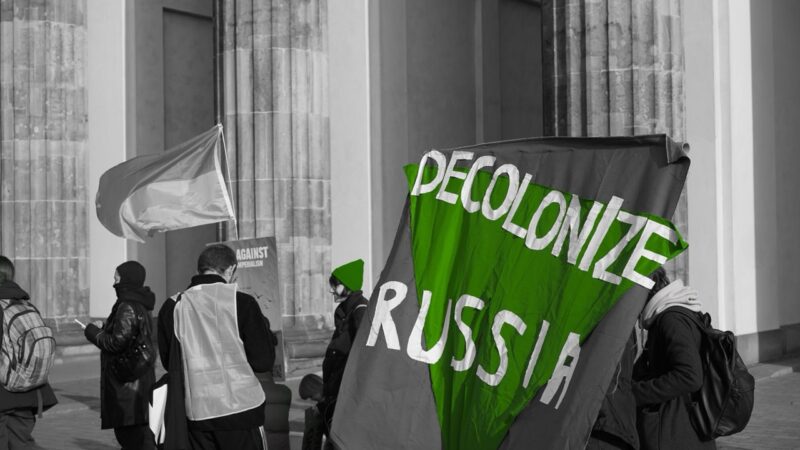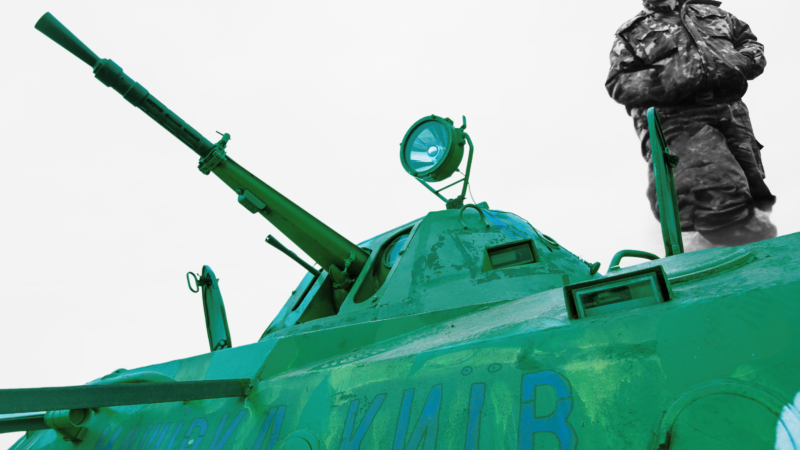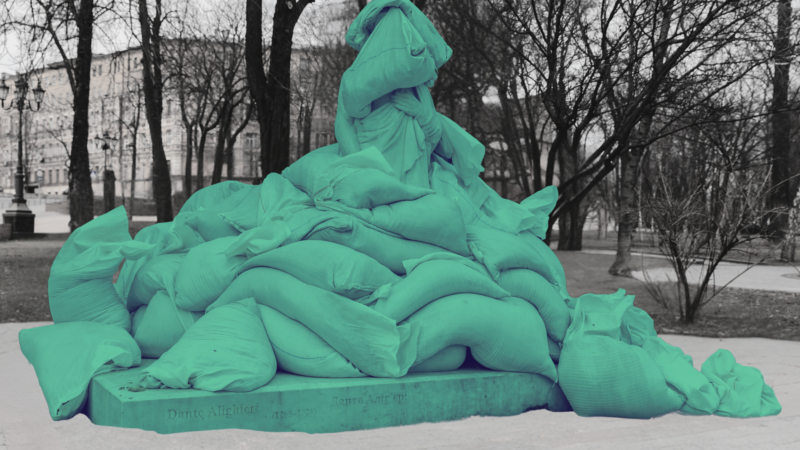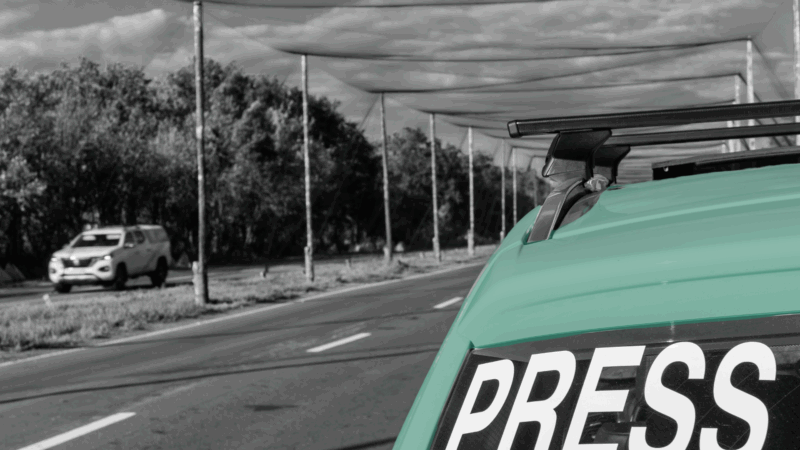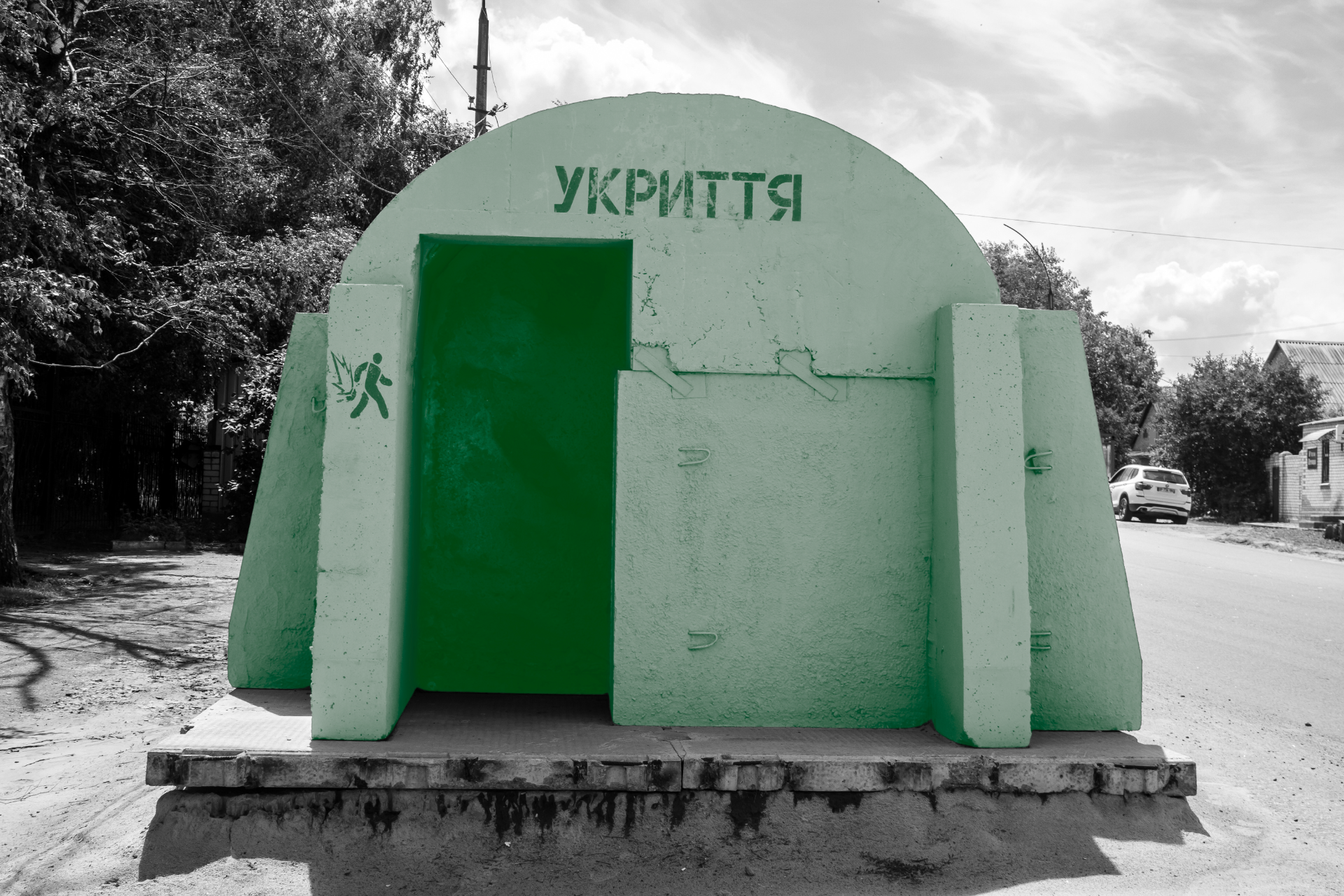Interview with Olexiy Haran | “What we are seeing now in Ukrainian society is grassroots Ukrainization”
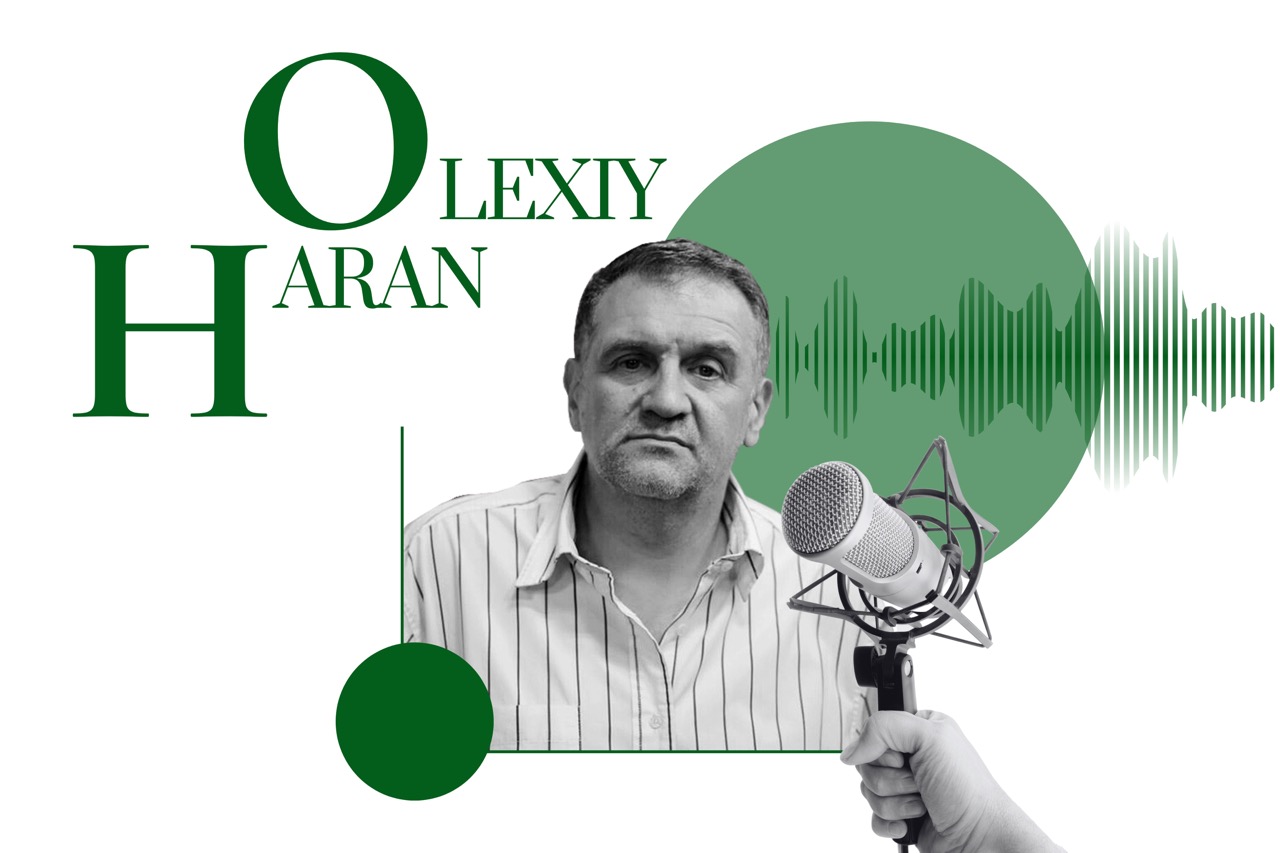
Ostap Kushnir: Having observed Ukrainian and Russian political life for years, did you foresee the Russian invasion of Ukraine on 24 February 2022?
Olexiy Haran: Before answering this question, I need to address a different one, namely, the Russian invasion in what form? My colleagues and I were aware that Russia had been gathering troops at Ukraine’s border, but we did not know if it would launch a full-scale invasion or a series of targeted strikes. The events of 2014 demonstrate that many of Vladimir Putin’s moves are hard to anticipate.
From a rational point of view, Putin should have never annexed Crimea or invaded the Donbas. Russia’s international and domestic positions were strong before 2014. The state was even accepted as a legitimate member of the G8 and could promote its vision of a multipolar world. Then, however, Putin decided to annex Crimea and thereby started the isolation of Russia. In my opinion, the annexation of Crimea was counterproductive to Russia’s national interests. The West seems to have shared the same belief, as they also got caught by surprise. Actually, very few experts in Ukraine and abroad, including myself, anticipated the annexation of Crimea because it was so irrational.
When the annexation was completed, I guessed that Putin would announce the creation of an “independent” Crimean republic, similar to Transnistria. However, he decided to incorporate Crimea into Russia. By doing so, Putin managed to increase his support among ordinary Russians but lost a lot of respect internationally.
Another irrational move was sending regular troops to the Donbas. Regardless of Russia’s official declarations, all careful observers did not doubt that the “little green man” (mercenaries with no military insignia) are Russian soldiers. Ukraine’s decision makers and the majority of Western ones did not buy into the Russian game “nas tam net” [we are not there] and identified skirmishes in Donbas as an illegal invasion.
My colleagues and I tried to analyze a whole spectrum of scenarios related to the Russian invasion. However, before 24 February 2022, when bombarded with questions about “what will happen” and “how to behave,” I used to answer that Putin would likely escalate the situation in the Donbas and try reaching the North Crimean Canal and strategic ports on the Black Sea. I believed that the Kremlin would employ targeted strikes against command posts of the Ukrainian military, nothing more. It seemed irrational for Putin to start a full-scale invasion and try to conquer Kyiv and other major cities in the north. Therefore, I cannot say that I anticipated the invasion in the form that it took.
Kushnir: Was the response of Ukrainian society to the invasion a surprise for you, or did you expect something similar?
Haran: The response of Ukrainian society was predictable. The Democratic Initiatives Foundation conducted polls on the eve of the invasion on what would be the reaction to Russian military aggression if it occurred. The polls demonstrated that almost half of Ukrainians would resist, either directly by joining the army or indirectly by helping the army in any possible way. This is a very high figure. That being said, 1/5 of Ukrainians did not expect the invasion to happen. Additionally, 1/5 responded that they would simply try to survive.
In the first days of the invasion, when the fights for Hostomel airport broke out and diversionary groups appeared north of Kyiv, people got nervous. The worst-case scenarios, such as grinding urban skirmishes and total evacuation of civilians, suddenly became possible. My colleagues encouraged me to leave Kyiv because they thought I was on the Russian detention list. However, I decided to stay. I was publicly advocating the necessity to resist and support the Ukrainian army. In this situation, from a moral point of view I could not leave.
At a certain moment I went to the military registration point to get issued a weapon. However, there stood such a huge line of other volunteers that it was impossible to obtain anything. I tried my luck two times, unsuccessfully. That line—where one heard different languages and saw different ages and social strata—became the best evidence that Ukraine would win. I saw the desire to resist in the flesh, not numbers on paper. Unlike actions taken by people, numbers can be misleading.
In this respect, the reaction of the Western states was exemplary. They recognized the braveness of Ukrainians and praised President Volodymyr Zelensky for not leaving the country, unlike what President Ashraf Ghani of Afghanistan did in August 2021. I remember hearing from my Western colleagues about how bold our President was and how lucky we were to have such a leader. I responded that it was President Zelensky who was lucky, as he could rely on Ukrainian society. In other words, Zelensky was able to behave so boldly exactly because he was backed by a brave society.
It is also important to highlight that President Zelensky is a Russian-speaking Ukrainian of Jewish heritage. In this sense, yes, Ukrainian society is lucky: this sole fact undermined Russian propaganda claims that Ukraine had been “governed by Nazis.” In the figure of Zelensky, Western journalists and public opinion acquired a powerful counter-argument to shatter the Russian war narratives.
Since the escalation of this war Zelensky has undergone a major transformation. He fully switched to Ukrainian language for communication and started promoting valiant political objectives that had earlier been voiced only by nationalists. In his example, Zelensky demonstrated how a Ukrainian political nation could be built.
Speaking of political nation and the overall resilience of Ukrainian society, they did not miraculously appear overnight in February 2022. I have observed distinctive nation-building trends in Ukraine since 2014—not to mention that many of these trends revealed themselves much earlier, in 1991, right after Ukraine declared independence. Both Maidan revolutions as well as the powerful response to the Russian invasion since 2014 simply made these trends more visible to everyone.
Kushnir: In his interview for the Forum, Mykola Bielieskov highlighted that Ukrainian civil society has often shouldered the burden of functions normally assigned to the state, resorting to informal institutions and practices in order to achieve desired objectives. This could be observed, in particular, in the volunteer movement to support the army, as well as self-mobilization, delivering logistics and communications, assistance to displaced persons, and other activities. To what extent do you agree with the statement that Ukrainian civil society is acting in parallel with state institutions, sometimes demonstrating even greater effectiveness?
Haran: I find this statement rather convincing. If we look into the history of Ukraine, we may encounter abundant evidence that Ukrainians habitually distrusted the state and its authorities, which in most cases were foreign to them. At the same time, Ukrainians eagerly formed networks of cooperation and resistance. The latter networks, be they active or passive, usually targeted and sabotaged political figures who wanted to monopolize power.
In the 1980s the Ukrainian Rukh movement was born in an unwelcome Soviet environment with no Western support. In a way, Rukh became a genuine grassroots movement that addressed the domestic social demand. Afterwards, since 1991, the maturation of Ukrainian civil society has often surpassed corresponding state institutions. In this context, I would like to express my gratitude to Western partners, whose role was also important. Afterwards, the strength of Ukrainian civil society was successfully tested during both Maidan revolutions, in 2005 and 2014.
Post-2014 polls conducted by the Democratic Initiatives Foundation proved that Ukrainians have continued to distrust the authorities. Instead, their highest trust was put in institutions where the social component was the most articulate: the armed forces, church, volunteers (volontery, who provide direct army support), and civil society organizations.
The most recent poll conducted by the Democratic Initiatives Foundation together with the Razumkov Centre (August 2022) also proved the validity of the earlier trends. The institutions with the highest balance of trust and distrust were the armed forces (91 per cent), national guard (81 per cent), volunteer organizations (77 per cent), volunteer detachments (73 per cent), and finally the President of Ukraine (71 per cent). Instead, the balance of trust was negative for the strictly governing institutions: the government (–7 per cent), the parliament (–11 per cent), the courts (–46 per cent), and finally the political parties (–55 per cent).
Kushnir: In light of the war needs, the current government restricted the rights and freedoms of citizens and introduced many monopolies, in particular on the dissemination of information in the media. Will the government be tempted to keep these restrictions and monopolies after the war?
Haran: Indeed, there are restrictions in war-time Ukraine. We live in a time of martial law. However, I would like to stress that the level of freedom of speech remains extremely high. This is a very uncommon practice under martial law.
The opposition’s television channels continue to function. There are some challenges in reaching them, but if citizens of Ukraine want to hear their messages, they can. Apart from this, the Internet media and newspapers exist for all people who want to be active in politics or simply ascertain different perspectives. These media and newspapers offer a plurality of views, openly criticizing authorities and discussing the effectiveness of government actions.
I also consider it a positive development that the opposition supported the government and voted for martial law in February 2022. A tacit agreement is in place between the government and the opposition that the latter will not excessively criticize the former in wartime. Considering the situation, this looks like a reasonable and healthy compromise.
When speaking to Ukrainian media, I follow a simple rule: never criticize military operations, actions, Ukrainian command, or military leadership. Today is not the best time and circumstances for this. However, I do not feel restrained, and I also deem it justifiable to criticize certain political occurrences. I think it is important to talk about non-war-related misconduct even during a war. Ukrainians are fighting not only for the freedom and restoration of their territorial integrity today but for a new and prosperous country.
Moreover, I want to praise the decision of the EU to grant candidate status to Ukraine. While this status may not turn into full-fledged membership for a long time, the very fact of its granting serves as a powerful tool for domestic transformation. To illustrate, let us look at the dynamics of the appointment of Director of the National Anti-Corruption Bureau. For several months, the appointing commission could not meet because some of its members were allegedly ill. However, after the government started preparations to fulfill the EU’s candidacy criteria, suddenly all the members of the commission recovered, the meeting took place, and the Anti-Corruption Prosecutor got appointed—the same one who earlier had won in transparent elections. I can only imagine how much the Office of the President was against such an appointment, but it finally had to agree to the demands put forward by the Ukrainian civil society and the EU.
Therefore, I believe that the doubled domestic and international pressure on Ukraine’s government will continue. Monopolization of power is hardly possible. I am sure that Ukraine will remain democratic after the victory.
Kushnir: Religion, language, identity, regional self-identification—to what extent did these factors fade, or on the contrary, became more pronounced in Ukrainian society during the war?
Haran: We are experiencing a consolidation of Ukrainians today to an extent that has never existed before. Having said that, I would like to return to my thesis that the consolidating trend first appeared in 1991. Afterwards, it was proven true and strengthened in the events of 2004, 2014, and 2022.
What we are seeing now in Ukrainian society is grassroots Ukrainization—at least, this is how I define it. National values are not imposed by the government or political elites, but spread within and between people. To illustrate, let us take decommunization. There were attempts to get rid of the Soviet legacy under President Viktor Yushchenko, in the late 2000s. However, these attempts were not successful. On the contrary, the decommunization and Leninopad after 2014 were incomparably more effective as the demand came from below. Therefore, it was easier for the government to conduct an official campaign against the Soviet legacy because the people supported it.
The consolidation of Ukrainians that we see today has deep roots. It reflects the existential necessities of society. Even before February 2022, the majority of Ukrainians agreed that there should be one official language. Every public figure was supposed to know and actively use Ukrainian in communication. Basically, a language consensus in Ukrainian society was successfully developed by the end of the third decade of the state’s existence.
I used to visit the front lines as a volunteer and have been doing it regularly since 2014. Around half of the Ukrainian army, both soldiers and their command, spoke Russian in my presence. At the same time, they did their best to master the Ukrainian language and switch to it on every occasion. The trend was apparent.
Also, I do not see a problem with the people who continue speaking Russian in Ukraine’s south or east, even in Kyiv. It often happens that they use the Russian language and practice Russian culture in their private circles. As for the public sphere, they reveal a deep understanding of the importance and role of the Ukrainian language and culture. This trend will only be strengthening in the future.
Our poll from August 2022 demonstrates that Ukrainians, regardless of their backgrounds, are proud of their citizenship, which is a healthy indicator of the formation of a political nation. They also believe in Ukraine’s victory. An interesting observation is that Ukrainians do not support concessions to Russia to end the war. For its part, the Western public still perceives concessions as something inevitable. I was asked many times by foreign experts when Ukrainians would finally get tired of the resistance and agree to trade a part of their land for peace. However, they did not want to. For me, it looks even strange that the polls did not indicate fatigue. But indeed Ukrainians looked angry, not tired.
Having said that, the mentioned consolidation does not come without challenges. In most regions, when we asked respondents for their attitudes toward the renaming of toponyms that reflect Russian or Soviet legacy (e.g. streets, settlements – O.K.), the reaction was positive. However, only 27 per cent of respondents in the south supported the renaming while 42 per cent spoke against it. This observation is disturbing and shows that much remains to be done in order to overcome the remnants of colonial influence in the south. I am very curious to see what happens to the monument of Empress Catherine II in Odesa. My guess is that sooner or later it will be demolished.
Finally, there is the attitude to the Russian Orthodox Church of the Moscow Patriarchate. Our August 2022 poll enquired respondents to choose one of two options: “Actions of Moscow Patriarchate rather encourage Russian aggression” or “Actions of Moscow Patriarchate rather help to defend Ukraine.” 52 per cent chose the former option while only 11 per cent chose the latter. 37 per cent of respondents answered “hard to say” or disagreed with both options. However, only 26 per cent in the south and 33 per cent in the east blamed the Moscow Patriarchate for encouraging Russian aggression. These percentages are still higher than those who believe in the help of the Moscow Patriarchate to defend Ukraine, but the largest category of respondents remained in-between or undecided.
When we deal with the functioning of the Moscow Patriarchate in the context of national unity, I believe that it is crucial to have a “wave from below,” a grassroots demand for change. Religious convictions are very hard to influence, as they often rely on well-established conservative structures on the ground. Therefore, it will be very difficult to have a swift decision on the fate of the Moscow Patriarchate. And here I think that the state should abandon so called neutrality, become proactive, and lead reforms especially when there it is known that many hierarchs of this church supported the aggressor.
Kushnir: Do you agree with the statement that Russia invaded Ukraine because the latter became an existentially dangerous “Anti-Russia”? To what extent is the current war a war of values?
Haran: I believe that Ukraine has never been “Anti-Russia.” Even today, in the conditions of a full-scale invasion, the attitude toward the Russian culture is sceptical or even negative, but not vicious or utterly intolerant. Ukraine is a democratic country. That being said, it may become “Anti-Russia” after the gravity of crimes and atrocities that Russians committed on its lands is fully acknowledged.
As I mentioned, more and more people in Ukraine will switch from Russian to the Ukrainian language and culture. However, there will never be 100 per cent of switches. Many people will continue practising Russian culture, speak Russian, and even attend churches of the Moscow Patriarchate, especially if the latter re-brands itself.
When we speak about ethnic Russians in Ukraine, I believe, there are no major problems with their safety and liberties. They are not existentially threatened. Ethnic Russians are also legitimate parts of the Ukrainian political nation. In this sense, again, Ukraine has never been “Anti-Russia.”
However, the overall public mood changed significantly after February 2022. Ukrainians became suspicious of everything which originates within the Russian domain. I believe this feeling of suspicion is justified. It can be observed not only in Ukraine but in many Western societies too.
I also agree that Russia and Ukraine are fighting a war of values today. We have a clash between democracy and authoritarianism or even totalitarianism.
Kushnir: How do you see Ukrainian-Russian relations after the war?
Haran: Unless Russia changes its imperial approach to Ukraine, there will be no normal relations. When we ask Ukrainians in polls about what they understand as “victory,” 20 per cent say that it is the defeat of the Russian army accompanied by the disintegration of the Russian Federation. The narratives about the necessity for Russia to split into smaller parts are being promoted even by some of Ukraine’s political elites.
I strongly believe that only the ethnic minorities in Russia should decide on their belonging to the Russian Federation. In turn, all Russian citizens should decide together on the nature of the federation moving forward. Therefore, Ukrainian officials should not be expressing their opinions on the disintegration of Russia. It is not their business to bring such opinions to the public. Excessive expostulation on this topic may be counterproductive.
The business of Ukraine today is to make Russia stop being an imperialist state. Only this scenario will allow for the gradual restoration of good-neighbourly relations.
Kushnir: Do you think that Western countries and Western societies have understood Ukraine better since 24 February 2022?
Haran: I think they have. Ursula von der Leyen, the President of the European Commission, for instance, stated that “Ukraine is one of us.” The change of position of Frank-Walter Steinmeier, the President of Germany, to a more pro-Ukrainian one was also eloquent. He openly recognized his mistakes in mistreating Ukraine and appeasing Russia in a brave and self-critical move.
I want to emphasize again that Moscow’s actions and policies in the West were totally counterproductive for Russia. The image of the state suffered a lot. However, there still remain many Putin-understanders, or Putin-Verstehers, in the West. They have eventually agreed today that Ukraine is waging a just war, they even subtly support Ukraine, but nevertheless advocate for a compromise with Russia which may, for instance, reside in recognizing the annexation of Crimea. For me, this looks like an appeasement policy again. This looks like flirting with Adolf Hitler.
There are also many experts who criticize Ukraine for not being willing to negotiate peace, Minsk agreements, or carry a part of the responsibility for escalation. There also are those who portray Ukraine as a corrupted and failed state that will eventually fall to Russia. I am not sure that we should treat comments from such Western experts seriously. Some of them indeed change their positions with time, but very few recognize their mistakes.
Volodymyr Kulyk actually raised the issue of the absence of repentance coming from Western experts and decision-makers for their mistaken approach. Since 2014 they have been blaming Ukraine, not Russia, for the bloodshed. In the best case, they put equal responsibility on both belligerents. Do they recognize their own responsibility?
To sum up: Unfortunately, Western media and experts continue to support Russian narratives in many cases. Fortunately, the truth is on our side. Zelensky’s speeches and media addresses sound so powerful exactly because he speaks the truth.
Kushnir: In her interview last month, Mariia Zolkina stated that Western decision-makers and experts avoided discussing the possible disintegration of Russia if Putin loses the war. They regard the scenario of disintegration with fear. In your opinion, has something changed in a month?
Haran: As I have mentioned above, Ukraine should recognize and support movements in Russia that speak against political oppression, but it is not Ukraine’s business to decide on the future structure of Russia.
Regarding the perceptions of the West, I believe we can draw parallels to what happened in the 1990s. The West was afraid of the collapse of the Soviet Union, yet it happened. Similarly, the West is afraid of the disintegration of Russia and, if it happens, that the situation in the whole world may become unstable.
However, I think that all sides should seriously analyze the prospect of Russia’s disintegration today. Whether they like it or not, such a prospect should not be rejected by responsible decision-makers and experts. The case of the Soviet Union provides the best evidence for the necessity of getting ready for unpredictable events, even if the probability of these events seems to be low.
